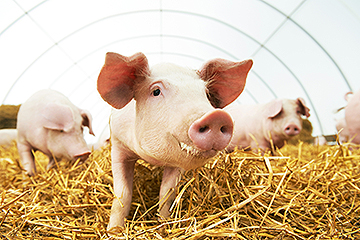The latest outbreak of the African swine fever (ASF) in Uganda has been depressing and dramatic. Whereas farmers are still counting the losses from the unpredictable Covid-19 and its related lockdown measures, the outbreak of the ASF announced first in northern Uganda is especially depressing.
Pig farming is one of the fastest growing livestock activities in the peri-urban areas and among smallholder farmers.
Uganda has the largest and fastest growing pig production in eastern Africa with the pig population standing at 3.2 million as of the 2008 census. But ASF is hampering the development of the pig industry.
Kitgum District has reported 500 new outbreaks with further deaths of between 700 to 1,500 in Otuke District. According to a study published in the Journal of Veterinary Medicine in 2013, the African swine fever is ranked as the most important disease of pigs that mostly occurs during the dry season, as a result of movements due to trade and restocking as the major risk factors.
Big threat
ASF is a highly fatal viral disease of domestic pigs and can cause mortality of up to 100 per cent of affected pigs. The transmission of the African swine fever is both direct and vector-borne.
The disease is highly contagious and is transmitted by direct contact between infected pigs and susceptible ones or by contact with or ingestion of infectious secretions. The virus is highly resistant in tissues and the environment, contributing to its transmission over long distances through contaminated material, vehicles, or visitors to pig farms.
Despite being a deadly disease of pigs and wild boar, it does not affect people but has severe consequences for those who are reliant on pigs as food and income.
As a result of the outbreak, pork prices are expected to rise as production is limited to keep pace with demand. But secondary industries that deal with the supply of feed ingredients will also feel the pinch.
Diagnosis
The African swine flu can be suspected based on clinical signs but animal health experts assert that confirmation must be made by laboratory tests because signs of ASF are very similar to classical swine fever. Affected animals with acute symptoms have high fever, hemorrhages and high morbidity and mortality rates.
The main clinical signs are fever, loss of appetite, lack of energy and sudden death with few signs beforehand.
Affected pigs normally die of pneumonia while survivors are chronically emaciated, have stunted growth, and bony swellings on the skin, among other signs. Other signs can include vomiting, diarrhoea, red or dark skin, particularly on the ears and snout, discharges from the eyes and nose, laboured breathing and coughing, abortion in pregnant sows, weakness and unsteady gait.
Safety first
Currently, there is no approved vaccine and treatment options for ASF and experts caution that emphasis should be put on practising good biosecurity at the farm level.
This, they argue, is essential for reducing the likelihood of an ASF outbreak. These measures are primarily aimed at preventing entrance of infection into the farm.
According to Joseph Musisi, a mobile veterinary officer at Elite Veterinary Clinic, the recommended measures are limiting the number of visitors to a minimum and making any [visitors] that enter your pig sty to change into clothing and boots that are kept on the farm.
He explains that feeding pigs on kitchen scraps puts them at risk of contracting the disease. “It is important to be cautious after visiting any premises where there are pigs. Therefore, immediately after you return, change or clean your clothes thoroughly,” he advises.
Sanitary measures including early detection, culling and disinfection as well as movement controls. According to the World Organisation for Animal Health (OIE), most times the soft tick vector should also be considered in the control programme.
Animal health experts are concerned that although the desired interventions of biosecurity yield positive outcomes, they result in reduction of farmer profit margins making commercial pig rearing difficult.
This is partly the reason why sometimes farmers may be unwilling to adopt biosecurity practices aimed at solely controlling African swine fever outbreaks.
Advice
Currently, there is no approved vaccine and treatment options for ASF and experts caution that emphasis should be put on practising good biosecurity at the farm level.


